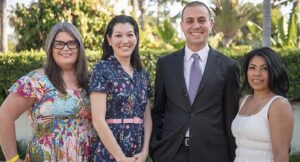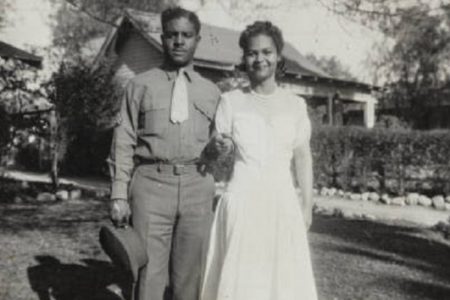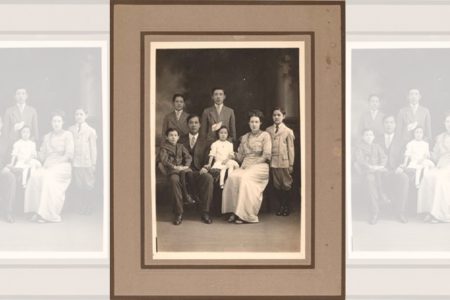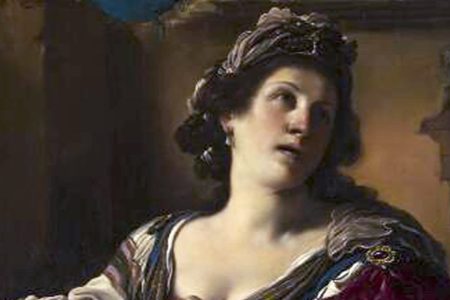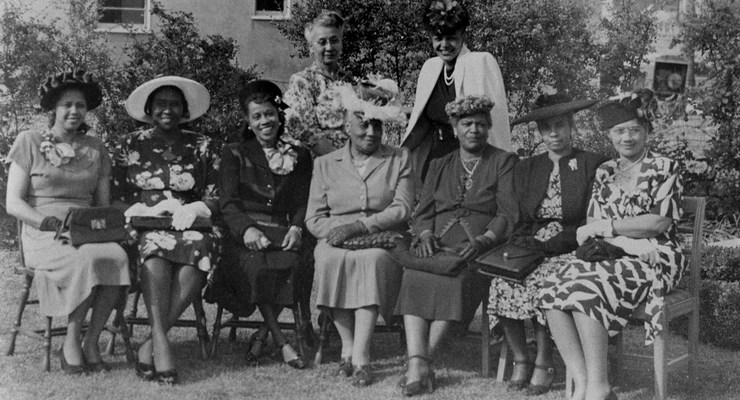
Mother’s Day Tea held for local NAACP members in the 1950s. [Image courtesy of the Pasadena Museum of History (BH-L4-4)]
Black History Month is coming to an end, but the Pasadena Museum of History wants to ensure that the history of Pasadena’s African American community is something that is recognized and celebrated not only in February but also throughout the year.
The museum is doing this with its Black History Collection, consisting of taped interviews, indices, donor lists, photographs, family material, newspaper articles, information about churches, community leaders, education, and pioneers. It also includes the Samuel C. Sheats Papers.
The genesis of the Black History Collection was the Museum’s outreach effort to assemble material for a documentary, “The Changing Rose,” that the Museum produced in 1984.
Historian Robin Kelley, who’s currently a history professor at UCLA, interviewed Black community members and collected photographs and memorabilia for the documentary, which make up the bulk of the collection. Many of these materials date from the early 20th century, and shed light on a less-visible period in African American life prior to the Second Great Migration.
The materials were also included in a 1985 museum exhibition entitled “Early Days in Pasadena’s Black History.”
The Samuel C. Sheats Papers are included in the collection. Sheats (1924-1993) was a local lawyer and civic leader, who was a member of the Pasadena NAACP and fought against segregation in Pasadena schools. The entire collection, which includes more than 3,000 pages of materials and 400 historic photographs, tells the stories and struggles of Black citizens who either migrated to or grew up in Pasadena.
Among the stories in the Black History Collection that Panton remembers is that of a very light-skinned African American woman, Joan Williams, who was chosen to be Miss Crown City for the Tournament of Roses in 1958. Shortly before the Rose Parade on Jan. 1, 1959, it was discovered that Williams was African American. City officials decided to cancel the City’s float as a result.
It wasn’t until January 1, 2015, that Williams was finally able to ride the Rose Parade float, upon invitation by Pasadena City officials who also apologized to her for the unfortunate episode in 1959. Williams died on Feb. 20, 2019 at her home near the Rose Bowl Stadium. She was 86.
The Black History Collection also includes an oral history portion, including interviews that Kelly did of 27 prominent members of the African American community in Pasadena, among them Olympian Mack Robinson; Ray Bartlett, who was Jackie Robinson’s college teammate, a veteran, and one of the first black employees of Los Angeles County Fire Department; and Ruth Wright who was married to the founder of Pasadena NAACP John Wright.
The audio has been digitized as a part of the California Revealed Project, a State Library initiative that helps public libraries throughout the state digitize, preserve, and provide online access to the archived materials. You can search through the archived interviews and listen to them on the California Revealed website, www.californiarevealed.org/
Adrian Panton himself utilized the Black History Collection in 2011 when he curated an online exhibition on Flickr, “Glimpses of Early Black History in Pasadena, 1850 to 1950.” The 50 photographs, and their accompanying captions, were taken from an illustrated talk that Panton developed that explores the rich and complex history of African Americans in Pasadena. The online exhibit, still available online through www.flickr.com/photos/
Launched in 2010, the Pasadena Digital History Collaboration makes available web-accessible historical content from the Pasadena Public Library, Pasadena City College, the Huntington Library, Art Collections and Botanical Gardens, Pasadena Buddhist Temple, private collections from families of Pasadena, and the Pasadena Museum of History.
Information about the Pasadena Digital History Collaboration project, and the items preserved online, can be found at www.pasadenadigitalhistory.com
The Black History Collection, one of more than 250 special collections in the archives at Pasadena Museum of History, is part of a generous digitization grant from the National Endowment for the Humanities (NEH) as part of USC’s “L.A. as Subject” Community Histories Digitization project. Overall, the project involves digitization of approximately 17,000 items, including paper materials, historic photographs, video recordings, and other unique items from collections held by six community archives in the “L.A. as Subject” research alliance.
The project is expected to add to the visibility of collections in Southern California that document underrepresented community histories.
Currently, due to COVID-19, the Pasadena Museum of History, at 470 W. Walnut Street, is temporarily closed to the public. Anyone interested, however, can look through the Black History Collection, as well as other museums’ and libraries’ collections, through the Pasadena Digital History Collaboration website, www.pasadenadigitalhistory.com
